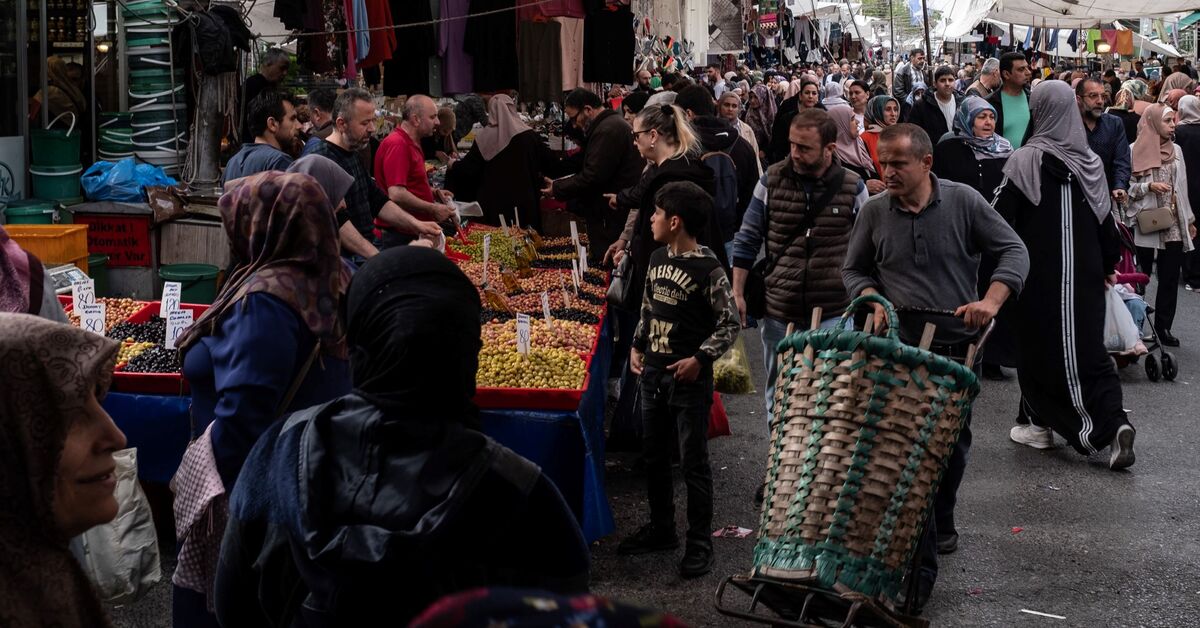A blue sticker posted in a dingy supermarket in the Aegean coastal town of Cesme sports a photo of President Recep Tayyip Erdogan with a smug smile. “Is this product too expensive for you? It is because of Erdogan,” it says in bold black letters.
The market owner says an elderly customer put it there earlier this month after the Turkish government increased the value-added tax (VAT) on cleaning and hygiene products by two points. “I voted for Erdogan in the last elections, but when she asked to stick it here on the detergent shelf, I did not object,” he said. “These are hard times — you see it here, in the way people haggle over prices, buy less than what they used to, or retired grandparents look distressed when their grandchildren ask for a second ice cream.”
Then he becomes worried and asks that we do not use his name. “Perhaps I better remove it,” he said doubtfully. “Would it get me into trouble?”
The sticker with text reading: “Is this product too expensive for you? It is because of Erdogan.”
“Thank Erdogan” stickers had their heyday in April when Izmir-based designer Mahir Akkoyun displayed them on social media, suggesting people paste them on the products or market shelves. His tweet became viral within minutes, and he was overloaded with requests for stickers.
Akkoyun said that he had designed them out of frustration with continuous price hikes, particularly on essential products such as milk and cheese, and wanted to give a strong message before the May elections.
“I did not expect to have such a great interest,” he said. “People kept posting those stickers at markets, then sharing them online.” He announced that anyone who wanted it could duplicate the stickers, waiving his copyrights. He also urged people to seek market permission before posting them on the shelves.
Şöyle stickerlar tasarladım.
İnsanların enflasyonla ve hayat pahalılığıyla en çok yüzleştikleri yerler olan marketlerde, manavlarda, pazarlarda ve alışveriş merkezlerinde yer alan ürünlere ve ürün rafları gibi yerlere yapıştırılsın diye. pic.twitter.com/YpWtjYAMDT
— mahirgra (@mahirgra) April 5, 2023
Within 24 hours, Akkoyun was taken into custody, first for insulting the president and then for “seeking to manipulate elections.” He was cleared only last week, his lawyer Berfin Kaya told Al-Monitor on Wednesday.
“Erdogan won, and the price hikes rage on, worse than ever,” Akkoyun said.
On Tuesday, the opposition called for a special session of the Parliament to address the recent tax hikes — from fuel to everyday goods — imposed in the last three weeks. But the ruling Justice and Development Party (AKP) and its ally Nationalist Movement Party, which garnered a majority in the 600-seat-parliament, rejected the proposal.
Daily hikes
Price hikes or tax increases are happening almost daily in Turkey as the Erdogan government grapples with a budget deficit caused by increased spending ahead of the May elections and on rebuilding work after the earthquakes in southern Turkey. Reuters reported that the budget deficit jumped to 263.6 billion lira ($9.78 billion) in the first five months, up from 124.6 billion lira ($4.62 billion) a year earlier.
On July 7, the government raised VAT on various household goods from 8% to 10%, leading to bitter jokes, such as that a person on a minimum wage would need to work eight hours to get a pack of toilet paper. The tax on other goods, such as home appliances, was raised from 18% to 20%. Combined with the plunging value of the lira against foreign currencies, this put imported laptops, smartphones and home appliances out of the reach of many Turks.
A week later, Turkey raised petrol, gasoline, and diesel oil taxes. This was followed by increasing the euro-lira conversion rate for medicine prices by 30.5%. The Pharmacists Union has asked the government to lower taxes on some crucial medicines because many people can no longer afford them, particularly if their health insurance does not cover them.
“There is nothing that has not become more terribly expensive,” Tuba Ersanli, a retired banker, told Al-Monitor. Before the gas price increase became effective at midnight on July 24, Ersanli drove to the nearest gas station to fill her tank, waiting in line since many others had the same idea. “Two liras ($0.074) per liter may sound small when converted to dollars,” she said, but commuting 70 kilometers at least once a week, “it is no small amount. The gasoline hike means an increase in every single good within a week or two, including in the Sunday open market, where farmers will claim that the trip from farm to market has become more expensive.”
Turkey’s consumer price index rose 3.92% month-on-month, the highest since January, according to official data released July 5. This was attributed to the increase in alcohol and tobacco prices, which rose 11.13%. Transportation prices increased by 7.96 %. Annually, health sector prices rose by 65.69%, food and non-alcoholic beverages by 54%, and health costs by 65.69%. The highest annual raise was in the prices of restaurants and hotels, by 67.22%.
Getting worse before getting better
The appointment of high-flying economist Hafize Gaye Erkan as the new governor of the Central Bank and the return of AKP veteran Mehmet Simsek as treasury and finance minister was met with cautious optimism in Turkey and beyond. Many thought it signaled a possible return to more orthodox policies, including a U-turn from the president’s obsession of keeping interest rates low.
But the duo’s measures have caused more short-term pain for businesses and consumers. The Central Bank has more than doubled interest rates over the past two months, and the lira has been allowed to depreciate sharply. The recent price hikes could rekindle inflation, which had declined to 38.21% in June from a 24-year high of 85.51% last October.
A day before Erkan rolls out Turkey’s quarterly inflation report and outlines her policies to the press, the Central Bank announced new measures to curb credit-card spending and limit loans to some industries. This will make it more costly for consumers to use credit cards for cash withdrawals and impose a stricter growth limit on car loans and some commercial credit.
Kerim Rota, a leading economist and the vice-chairman responsible for the economy in the opposition Future Party, said that if Erkan’s inflation forecast is not realistic, “it will cause the hopes for a rational economic policy will quickly evaporate. If she can give a realistic forecast, she must explain how the country’s fiscal policies would be adapted.”
“But the most important question of all is whether we can expect transparency from the Central Bank,” Rota said, alluding to the rumors that the Central Bank, tightly controlled by Erdogan, manipulated data, including Turkey’s inflation rate.
In May, Erkan’s predecessor, Erdogan loyalist Sahap Kavcioglu, stuck to its inflation forecast of 22.3% for 2023, less than half of market expectations and one-firth of the three-digit forecast of private ENAG Inflation Research Group.
Source:Al-Monitor



